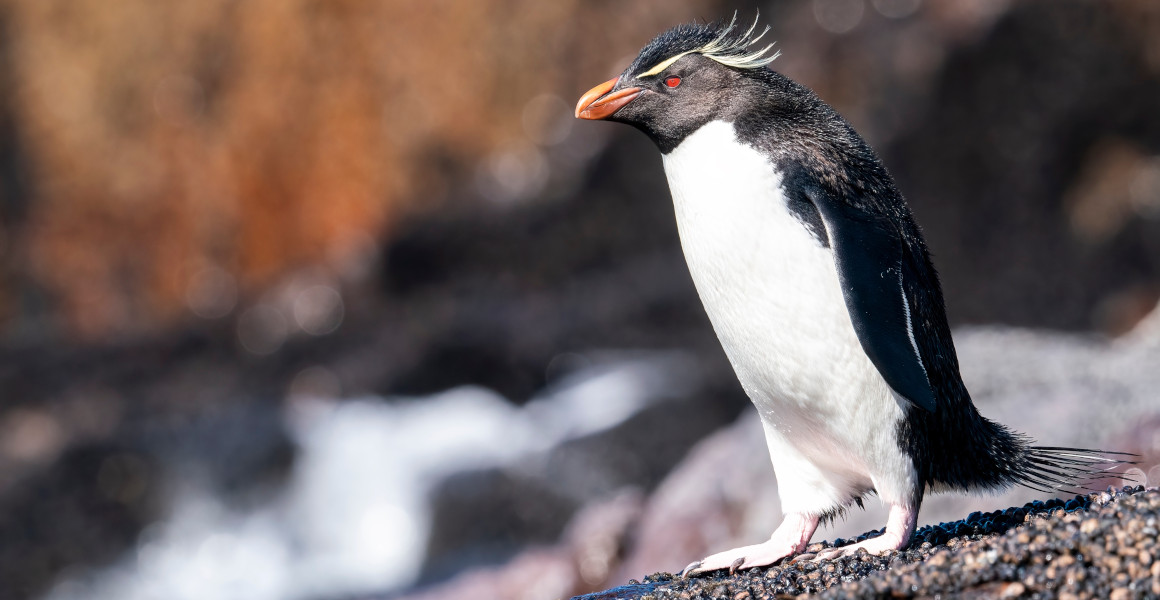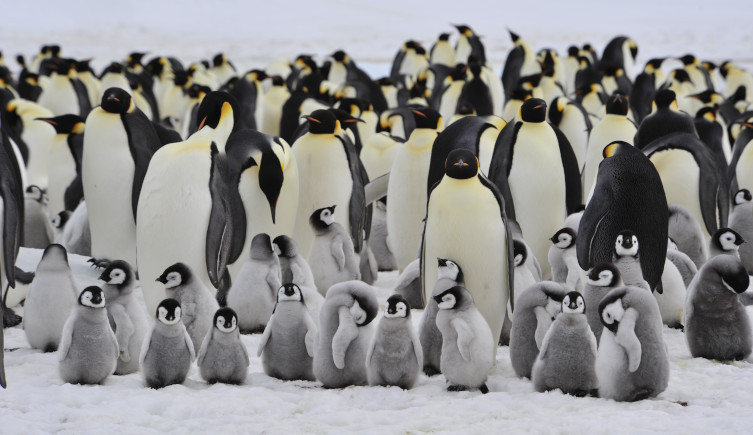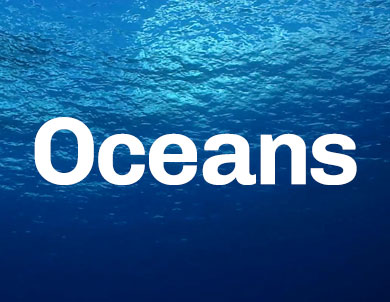The evolution of penguins has been laid out in unparalleled detail, revealing how they came into being.
While the aquatic birds have been shaped by periods of warming and cooling, modern climate change may be too much for them to cope with.

Smaller penguins, such as the rockhopper, have lower rates of evolution than larger species, which could limit their ability to adapt to changing climates. Image © Rob Jansen/Shutterstock
The evolution of penguins has been laid out in unparalleled detail, revealing how they came into being.
While the aquatic birds have been shaped by periods of warming and cooling, modern climate change may be too much for them to cope with.
Penguins are the slowpokes of bird evolution, which could affect their ability to adapt as their environment rapidly changes.
An international team of researchers found that penguin evolution is closely tied to changing climates throughout the past 60 million years of Earth history. The contraction and expansion of ancient ice sheets in the last three million years gave rise to most modern species, whose evolution has since slowed to a crawl.
Dr Daniel Ksepka, who co-authored the study, says, 'Penguins are large for birds, and tend to live a long time while reproducing slowly.'
'While we expected that penguins might have slower than average rates of molecular evolution because of these characteristics, we would never have guessed that would have the slowest rate yet seen in birds.'
'It's a topic that certainly warrants more investigation to try and discover why this occurs.'
The study, published in Nature Communications, also warns that penguins may struggle to adapt to the rapid pace of climate change.

Almost 70% of emperor penguin colonies could be driven extinct in the next 50 years. Image © vladsilver/Shutterstock
Evidence of penguin ancestors such as Kupoupou stilwelli can be found from over 60 million years ago, shortly after the extinction of the dinosaurs. However, evidence of penguins as we know them now is only found much later.
Previous studies estimated the last common ancestor of modern penguins lived around 24 million years ago in the Oligocene. The world was warming as this epoch ended, but Antarctica remained covered in ice.
However, the new study pushes the evolution of penguins significantly later. By comparing genetic samples of living species with information from fossils, the researchers estimated that ancestors of modern penguins evolved around 14 million years ago.
This is around the same time as an event known as the middle Miocene climate transition (MMCT) when the world's temperature dropped by as much as 17⁰C as more carbon dioxide was locked into the deep ocean. This would have provided a strong selective pressure for the ancestors of penguin to rapidly adapt to cold environments.
By this point in history, the birds had expanded out of what is now New Zealand and into South America and Antarctica. As ice sheets expanded during the MMCT, and new ocean currents formed, penguins subsequently spread to Australia and Africa.
The 18 species of penguin that exist today mostly evolved within the last three million years, with the study finding evidence of selection for genes that make penguins less buoyant; allow them to focus better on the blue light found underwater and swim in low oxygen conditions.
This period of speciation was accompanied by a sharp rise in the evolutionary rate of the birds, which had otherwise been on a downward trend for over 10 million years.
Following this period, the evolutionary rate began to fall once again, which may pose a challenge for penguins facing modern climate change.

The Antarctic is warming at an unprecedented rate, threatening human and animal populations. Image © Robert Mcgillivray/Shutterstock
The Antarctic is rapidly changing as the world warms, with the West Antarctic Ice Sheet estimated to be among one of the most rapidly warming areas of the world. Between 1957 and 2006 the area is thought to have warmed by almost 0.2⁰C a decade, around twice the rate of the rest of the continent.
Rising temperatures have caused the ice sheet to melt at an increasing rate. The Thwaites glacier, which is already responsible for around 4% of global sea level rise, is estimated to begin collapsing before 2030.
If the entire glacier breaks up, the sea level could rise by over 65 centimetres globally, and threaten low-lying islands such as the Maldives, the Seychelles and parts of Hawaii.
The loss of ice also has implications for penguins too, which use sea ice to breed, rest and moult. Their prey, such as Antarctic silverfish, also depend on ice to reproduce and shelter and any declines in prey will affect penguin populations further.
The study looked at how the different traits of the species have affected their populations in past climate change events to help understand how they will adapt to the Anthropocene.
The researchers found that penguins which migrate and forage offshore, such as the Adélie penguin, responded better to climate shifts during the last Ice Age than those which inhabit specific residential areas, such as the African penguin.
Modern climate change, however, will likely be too fast for penguins to adapt in time.
'Penguins are perfectly capable of adapting to shifting climate on a time scale of tens of thousands or even millions of years, but we are now facing unprecedented rates of global heating,' Daniel says. 'If the polar ice sheets melt away rapidly in the next century, for example, there just won't be enough time for penguins to evolve to the new conditions.'
Even the migratory, and larger, penguins which have previously responded better to changing climates in the past will struggle to keep up with modern climate change. At the current rate of warming, even the biggest species of penguin, the emperor, will see around 70% of their colonies wiped out by 2050.
Though they may have lasted for tens of millions of years, and faced climate change many times before, the ability of penguins to survive the Anthropocene is uncertain. Cutting global carbon emissions and limiting the effects of warming in the southern hemisphere will be crucial to preserving these iconic birds.

Find out more about why we need to protect the oceans, find themed events, and read about the pioneering work of the Museum's marine scientists.
Don't miss a thing
Receive email updates about our news, science, exhibitions, events, products, services and fundraising activities. We may occasionally include third-party content from our corporate partners and other museums. We will not share your personal details with these third parties. You must be over the age of 13. Privacy notice.
Follow us on social media